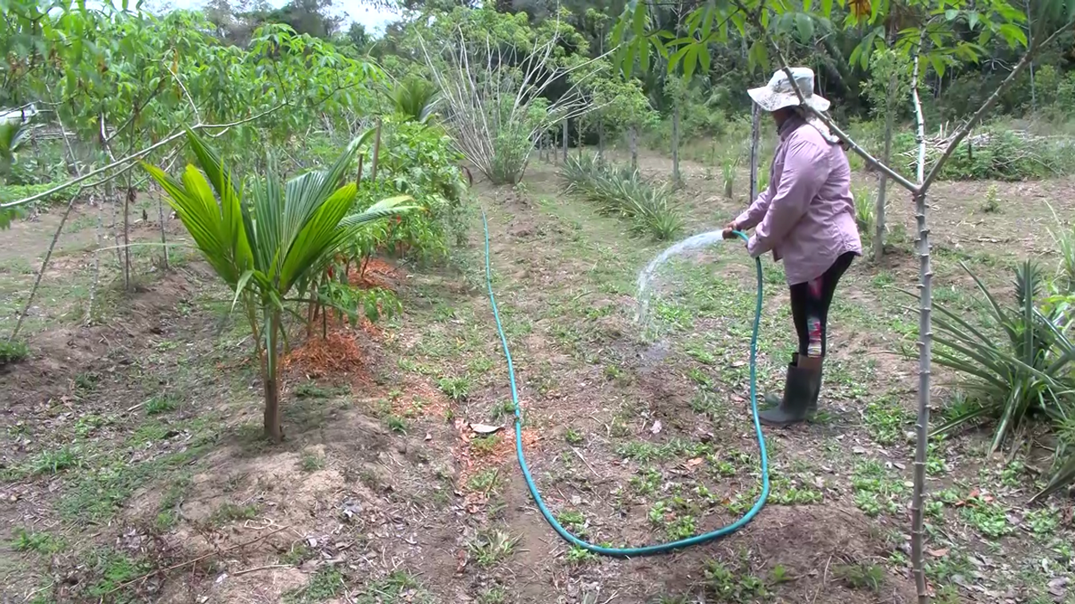Each year, the National Agriculture and Trade Show Committee selects a woman farmer of the year. This person needs to meet a list of criteria to even be considered for the prestigious recognition. Noemi Requena is the committee’s pick for 2025 and as we found out, she did not only meet the requirements but surpassed them. Requena, as we learned, is a full-time manager of a business, but for the past several years, she has been successfully juggling full-time employment with diversified farming, voluntarily training young farmers in sustainable farming techniques, while still looking after her family. She was happy to give us a tour of her farm when we visited on Saturday. News Five’s Marion Ali reports.
Noemi Requena, Woman Farmer of the Year, 2025
“Compost material – what I do, I practice a lot of composting, so I make my own compost.”
Noemi Requena of Punta Gorda is this year’s Woman Farmer of the Year. She attained that recognition by farming and managing a three-acre plot of land on an eight-acre ranch in Cattle Landing Village, a few miles out of the town. We visited Requena on Saturday, which was coincidentally her birthday. We found her busily caring for the crops and animals that she grows there.
Noemi Requena
“We would come early in the morning, sometimes at five in the morning and we start to water our plants. After finishing the watering, we feed our chickens, then our pigs, ensure the animals all the feed and water they need. We would harvest what needs to be harvested, then we start preparing beds to put in a new crop, different than what we had there.”
Noemi Requena
“We have coconuts, plantain, banana, okra, tomato, I have protein banks for my livestock. I have the nacedero and I have the mulberry bank. I have sweet potato – the two varieties.”
Marion Ali
“Why is it important to rotate?
Noemi Requena
“Because the different crops that we have draw different amounts of nutrients from the soil. So you don’t want to be using the same nutrients on the same crop. For example, where I harvested corn, I’m going to plant beans. Why, because beans gives back legume nitrogen to our soil. If we give back the nutrients to our soil, we can use the same area over and over.”
Noemi Requena
“I constantly hear people say “Oh, I don’t have land. We need ten acres; we need 150 acres.” In my opinion and experience, we can produce food and make an income out of a small area, as I have.”
For her, the added income from her farm helps to educate her three children. The 2025 Woman Farmer of the Year is assisted by her common-law husband, Evan Williams, who also has a full-time job elsewhere. We found him plowing when we showed up and asked him thereafter to explain that process to us.
Evan Williams, Common-law husband, Noemi Requena
“That job is necessary to aerate the soil and then loosen up the soil. So, the plants have no struggle getting it roots down, anchoring itself. We are preparing for yams. It’s better known as purple yams; iIt’s a tumor; it bears the fruit under the ground, so that’s why we are plowing the place, so if the soil is more loose, we get a bigger yield.”
About ten years ago, Requena earned a scholarship to take an agriculture course in the U.S. That was where she learned the basics of efficiently using the intercropping technique. Now she uses what she has learned to teach others during whatever spare time her full-time job, the family, and farming allows. A part of the farm system that Requena uses is solar-powered irrigation.
“We have a solar powered well, so we have two solar panels that pump our water from the well spot to the farm. And we have a small generator that gives us the pressure to be able to water our plants.”
Like with every other farmer, there are challenges that Requena faces. She must constantly find a way to naturally eliminate pests and to create proper drainage. And she uses all organic fertilizers that she also makes. A plus for her is that she uses pepper and cassava she harvests to make value-added products, such as pepper sauces and cassava dough. It is these kinds of efficient farming practices that the Director of Extension at the Ministry of Agriculture, Andre Mejia, told us impressed the judges who selected her for the award. He says Requena satisfied the rigorous criteria.
Andrew Mejia, Director of Extension, Ministry of Agriculture
“The judges go there, they ask questions to ensure that that is the actual farmer. No one can be a farmer of the year if they’re not the actual farmer, or if the crops on the ground are not for them. The criteria calls that she must be making a percentage of income from the farm and what she wowed the judges with is all the activities that she has going on.”
Noemi Requena
“I want us to use this platform to encourage other females that yes, we can do whatever we put our minds to, and I relate it to us being mothers to care for the little plants. We are mothers, we care for our babies, and that is what our plants need. We transplant them with care, we see them grow and they give us fruit, food, which is life.”
Noemi Requena will be presented with her prizes as Woman Farmer of the Year at the National Agriculture and Trade Show, set for May 30, 31 and June 1. Reporting for News Five, I’m Marion Ali.
